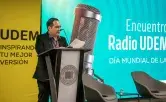Research Highlights Inequality in Paternity Leave
 Créditos: Archivo UDEM
Créditos: Archivo UDEM
- Paola Alvarado Estrada, a student at Universidad de Monterrey, developed the research project “Paternity Leave in Nuevo León: A Review of State Legislation from 2015 to 2024 from a Gender Equality Perspective” to earn her Bachelor’s Degree in Humanistic and Social Studies.
Although paternity leave in Nuevo León represents a step forward in terms of equality, a study by a student from the University of Monterrey concluded that there are still gaps to close and made it clear that paternity leave is still fertile ground for analysis from a gender perspective.
The Final Evaluation Project, titled Paternity Leave in Nuevo León: A Review of State Legislation from 2015 to 2024 from a Gender Equality Perspective, was developed by Paola Alvarado Estrada to obtain her Bachelor’s Degree in Humanistic and Social Studies at UDEM during the Spring 2025 semester.
The project was supervised by Professor Miguel Reyes González and stood out for addressing a topic without prior precedent in local academic research.
Alvarado conducted an in-depth investigation into the legislative evolution of paternity leave in Nuevo León, analyzing both progress and limitations of this benefit from a gender equality perspective, covering the period from 2015 to 2024.
Her analysis focused on the Civil Service Law of the State of Nuevo León, particularly the 2019 reform that extended paternity leave for state employees from five to sixty days. The lack of previous studies on this subject at the state level allowed Alvarado Estrada to make a valuable contribution to local gender equality literature.
The research was based on the recognition that paternity leave is a key tool for challenging traditional gender roles and promoting a more equitable distribution of domestic responsibilities between men and women.
Alvarado’s work also highlighted the scarcity of academic studies on the subject in Mexico, which made it difficult to compare her findings with similar research.
LEGISLATIVE INCONSISTENCIES
The analysis was structured around three core themes: gender equality, the benefit of paternal involvement in the lives of children, and the configuration of a new masculinity. These concepts served as the basis for reviewing both the content of the reform and its legislative context.
The research examined proposals submitted to the local Congress, parliamentary discussions, and observations made by the state’s Executive Branch. Additionally, maternity and paternity leave provisions in the same law were compared to determine whether the reforms aligned with the principle of substantive equality.
The results showed that gender equality was the most referenced category in the legislative documents (66.2 %), followed by parenting (32 %) and new masculinity (1.8 %). However, significant differences were identified between the conditions of the two types of leave.
Among the main inequalities found were the duration of leave (60 days for fathers versus 90 days for mothers), as well as the inability for fathers to start their leave before childbirth or to accumulate unused days, privileges that were granted to mothers.
Furthermore, the reform displayed inconsistencies regarding leave granted for adoption and extensions for extraordinary circumstances, which surprisingly tended to benefit fathers more. These differences highlighted the need for a more coherent and fair legislative review.
Paola Alvarado Estrada conducted a critical analysis of state legislation on paternity leave in Nuevo León and concluded that, although progress had been made, legal disparities with maternity leave still persisted.
I believe the legislation should be reviewed again, but in parallel with maternity and paternity leave [...] Not just with the superficial goal of speaking about gender equality in a narrow way, but to truly establish parameters,” she stated.
During her research, Alvarado Estrada also pointed out that Mexico still lagged behind in the public discussion on paternity leave and that, unlike Nuevo León, federal legislation had not undergone relevant changes since 2012.
“Legislation is beginning to address the issue, although not as frequently as it should; I believe that the current paternity leave is still insufficient,” she affirmed, while lamenting the absence of debates on the topic in legislative chambers and civil society.
“The sexual division of labor, both at home and in the workplace, is a crucial factor when talking about paternity leave: it’s about discussing what it means to be a woman and a man in the workforce,” Alvarado explained.
The research identified three key areas from which to address the topic: gender equality, shared parenting, and the construction of new masculinity. Through these perspectives, the author questioned the legal coherence between state and federal regulations.
“Paternity leave really only started to be implemented after a series of feminist struggles [...] It wasn’t men who initiated the conversations about masculinity,” she noted in an interview.
Alvarado pointed out that differences in the terms used in legislation — such as working days versus calendar days — have created uncertainty in their application, which, along with the lack of equal extensions for mothers and fathers, demonstrates the urgency of harmonizing both legal frameworks under principles of substantive equity.
Finally, the author proposed that future research should further explore the legislative process of these reforms, their practical application in both the public and private sectors, and the role of social actors in promoting awareness of this right.
PIONEERING WORK
Professor Miguel Reyes González, from the Faculty of Education and Humanities at the University of Monterrey, stated that Paola Alvarado Estrada’s research represented a pioneering contribution, as no previous studies on paternity leave in Nuevo León had been published.
“There was no published research related to paternity leave in Nuevo León. In that sense, Paola’s work is a groundbreaking local study,” said the professor.
Reyes González acknowledged that one of the main contributions of the research was to highlight the lack of standardization in legal concepts related to leave durations, which complicates both analysis and proper legislative reform.
“Not even Dr. Cándido Pérez Hernández, the leading researcher on this topic, emphasizes this issue regarding working days, calendar days, months; this periodicity isn’t even standardized,” he pointed out.
In addition to its academic value, the professor considered that the study provided useful legal and sociological foundations for potential legislative improvements.
He also emphasized that the curriculum of the Bachelor’s in Humanistic and Social Studies enabled Alvarado to develop critical thinking and analytical skills with real-world impact.
“Our students develop critical judgment in a particular way, a capacity for analysis and understanding of the sociocultural reality, a capacity to understand it, to interpret it and to propose alternative solutions to different problems, to translate them into very concrete questions or proposals,” he concluded.






Escribe un comentario